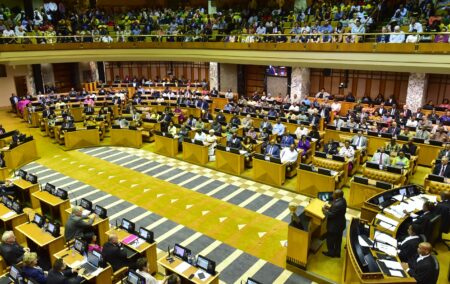The IEC recently released the party lists for the 2024 general election for public scrutiny. There has been much discussion about who has made safely electable positions on their party’s list, and who has been left out in the cold.
In particular, much has been said about Carl Niehaus, and how given his ranking of number 27 in the EFF’s national list, he has been ranked high enough to likely be elected to parliament, given that the EFF gained enough votes in 2019 for 44 MPs. However, this is misleading.
We do not have just the single national list that is directly elected proportionately. Yes, if you receive 10% of the votes, you get 10% of the seats, but only half of those will be elected off the national list. The other half will be elected by the ‘regions’ instead.
In this election, we will have three ballots. One is a single ballot for provincial legislatures, but for now let us ignore this one. The other two are what we will be using to elect our National Assembly MPs. Two hundred MPs will be elected off the national ballot, and 200 off the regional ballot. This second set of 200 has been divided proportionally between the regions, which are our nine provinces.
Thus, the regional MPs are divided as follows, according to the IEC:
- Eastern Cape: 25
- Free State: 11
- Gauteng: 48
- KZN: 41
- Limpopo: 19
- Mpumalanga: 15
- North West: 13
- Northern Cape: 5
- Western Cape: 23
This is 200 MPs.
Let us consider a hypothetical example, in this case, using the ANC. Let us say that the ANC has a poor election and finishes with 41% of the vote. This is a low number, but not impossible according to some polls. I am using this low number to show that some very senior ANC MPs are at serious risk of losing their seats, according to the polls.
Let us say that the ANC reaches this 41% by winning votes in the provinces as follows, then this is more or less the way that the regional MPs would be divvied up:
- Eastern Cape: 60% 15 regional MPs
- Free State: 40% 5 regional MPs
- Gauteng: 30% 15 regional MPs
- KZN: 30% 13 regional MPs
- Limpopo: 65% 13 regional MPs
- Mpumalanga: 55% 9 regional MPs
- North West: 55% 7 regional MPs
- Northern Cape: 50% 3 regional MPs
- Western Cape: 25% 6 regional MPs
(These percentages would more or less add up proportionally to about 41%)
You will notice that in most cases, the number has been rounded up rather than to the closet number, because there are many small parties which will not achieve the quota required for even a single seat. Some smaller parties will not get enough votes for regional seats, but will qualify for at least some seats overall, which will come from the national list. Thus, smaller parties will be slightly overrepresented on the national list, and large parties, in particular the ANC, will be slightly overrepresented on the regional lists, while being slightly underrepresented on the national list.
So, we have established that if the ANC has won 41%, it will be allocated 41% of the seats, which equates to 164 seats in total. We have established how many they will achieve from each region. The regional MPs as shown above add up to 86 seats. As such, in order to achieve proportionality, they will be awarded 78 seats from their national list. We can see now why the national list is also sometimes referred to as being ‘compensatory’ seats – that is, they will ensure overall proportionality.
If this result were to be the case, Police Minister Bheki Cele, at number 79 on the ANC’s national list, would just miss out. Ministers Naledi Pandor, Noxolo Kieviet, Thandi Modise, and other senior ANC MPs such as Snuki Zikalala, Faiez Jacobs, and Obed Bapela would all miss out. In this scenario, Bathabile Dlamini, at number 14 on the KZN regional list, would also just miss out. Zweli Mkhize, whom some people had said would be out of parliament due to his nonappearance on the national list, is safely ensconced at number 2 on this same KZN regional list.
As for the EFF, Carl Niehaus, at 27 on the EFF’s national list, and 9 on their Gauteng regional list, will need the party to grow somewhat from its current status to pick up a seat in Parliament. Busisiwe Mkhwebane will be left in the lurch unless the party sees some growth in Mpumalanga where she is at number three on the regional list. She will not get in at number 40 on the national list. Likewise, Mzwanele Manyi and Nazier Paulsen are too low on their respective lists to make it back to the national assembly.
In the DA, anti-crime activist Ian Cameron will safely enter parliament at number seven on the Western Cape’s provincial list, while in Action SA, we will see the return to elected office of Athol Trollip, who is at number 2 on the party’s national list.
All very interesting.
[Image: https://www.flickr.com/photos/governmentza/39403653365]
The views of the writer are not necessarily the views of the Daily Friend or the IRR.
If you like what you have just read, support the Daily Friend

